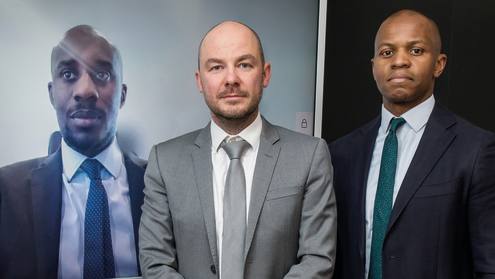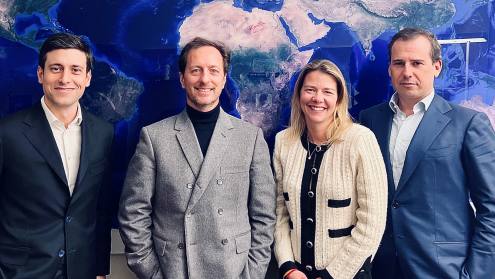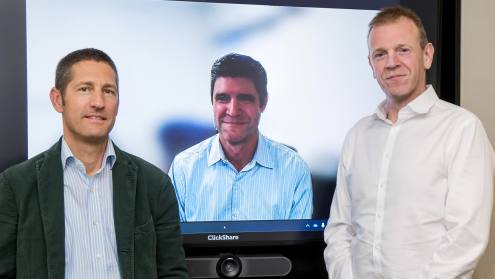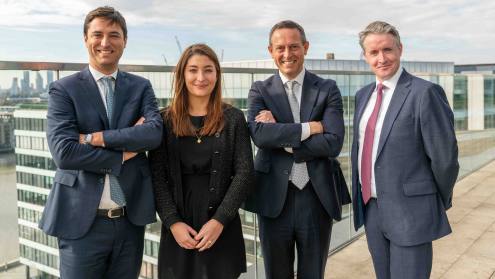The value of initial public offerings (IPOs) in the US and Europe may have fallen by 90% in 2022, but new listings on Middle Eastern exchanges are having a sparkling year. The leading bank on these regional deals by almost any measure is HSBC.
Gulf Co-operation Council (GCC) equity markets are enjoying the perfect storm, according to Chris Laing, the bank’s London-based head of emerging markets equity capital markets (ECM). “The GCC economies are very strong,” he says. “After a number of years of austerity because of low oil prices, very high oil prices are now generating huge economic surpluses.”
Starting even before its invasion of Ukraine, Russia has become uninvestable, Mr Laing adds. “So, for emerging market investors looking for a safe haven and good growth, the GCC has been standing head and shoulders above the rest,” he says.
The 2019 IPO of state-owned oil monopoly Saudi Aramco, the biggest in history, made it impossible for large global institutions to go on ignoring the Middle East.
More recently, in the UAE, the Abu Dhabi Securities Exchange (ADX) has been boosted by a number of IPOs, some linked to Abu Dhabi National Oil Company (Adnoc). The Dubai Financial Market, poleaxed by the global financial crisis, is trying to emulate its neighbour with the help of its own privatisations.
Strength in numbers
All these factors have combined to boost IPO numbers dramatically this year. In the year to late June, Middle Eastern IPOs totalled $12.6bn, according to Dealogic, compared with $674m in the same period last year, $1bn in 2020 and $1.5bn in 2019.
HSBC has been a notable beneficiary. “Our footprint as an institution is larger than any of our competitors,” says Riyadh-based Mohammed Fannouch, the bank’s head of investment banking advisory in Saudi Arabia. “With around 50 people working out of Riyadh, we have the largest headcount on the ground here of any local or international bank.”
“We cover every pool of demand: ESG, Islamic, local, international,” says Samer Deghaili, HSBC’s Dubai-based head of capital markets for Middle East, north Africa and Turkey (Menat).
The number and size of the mandates that HSBC has received this year reflect these strengths. The bank leads the Bloomberg 2022 year to date IPO rankings for the GCC, Menat and, indeed, Europe, the Middle East and Africa (EMEA).
While 2020 was noticeably quiet on the IPO front, with Middle East deals worth only $2.4bn, according to Dealogic, business began to pick up in 2021 as the total rose to $8.2bn. HSBC was present on the two big Abu Dhabi transactions of the year, Adnoc Drilling and Fertiglobe.
Adnoc Drilling is the largest national drilling company in the region by rig fleet size and enjoys monopoly provision of services to the Adnoc Group. Originally, 7.5% of the company was offered to the public in a fixed-price transaction. However, with books 31 times oversubscribed, this was increased during the book-build to 11%. The IPO raised $1.1bn, implying a market cap of $10bn. HSBC says it generated 14 of the top 15 orders.
“Adnoc Drilling has a captive customer but is also growing outside Abu Dhabi,” Mr Laing says. “So, the shares have limited downside, with upside potential.”
Fertiglobe is jointly owned by Adnoc and Amsterdam-listed fertiliser producer OCI, and is the world’s largest seaborne exporter of urea and ammonia combined. At the time, in October 2021, its IPO was the third-largest on the ADX and the first from a UAE free zone company.
With HSBC as a joint global co-ordinator, the deal raised $795m, valuing Fertiglobe at $5.8bn. The books were more than 20 times covered and by June this year the shares were trading 115% above their IPO price.
Record breaker
This year’s bumper deal from the region was the IPO of the Dubai Electricity and Water Authority, the first of a number of high-profile privatisations planned for 2022 and 2023. The transaction was launched in April, against a rocky global backdrop, including Russia’s invasion of Ukraine, but demand was overwhelming, internationally and locally, and the deal was increased from 6.5% free float to 18%.
HSBC was once again joint global co-ordinator on the deal, which priced at the top of the range, valuing the company at $33.8bn and raising $6.1bn. That made it the UAE’s largest-ever IPO, the Middle East’s second-largest and only the third IPO in EMEA to exceed $6bn since 2010.
A number of cornerstone investors, including the Emirates Investment Authority (EIA), ADQ (Abu Dhabi’s sovereign wealth fund) and UAE Strategic Investment Fund, provided $1.4bn of commitments. Excluding cornerstone and strategic investors, the books were 37 times covered at the final offer price.
June 2022 saw the IPO on ADX of petrochemical company Borouge, a joint venture between Adnoc and Borealis, an Austrian chemicals company. This was the fourth Adnoc-linked IPO and HSBC was the only international bank to have acted as global co-ordinator on all four.
HSBC has been at the forefront in bringing cornerstone investors into UAE IPOs
Given choppy market conditions and Abu Dhabi’s determination to succeed, a fixed-price offer was launched for 10% of the company’s shares. This valued the business at $20bn while raising $2bn, making it the largest ADX listing so far. Total demand exceeded $83bn.
The deal was supported by seven cornerstone investors, including EIA, ADQ and Abu Dhabi Pension Fund. “HSBC has been at the forefront in bringing cornerstone investors into UAE IPOs,” Mr Laing says. “They reduce the number of shares to sell and, more importantly, validate the valuation and equity story for independent third parties.”
Saudi shows the way
The altogether larger Saudi market, the Tadawul, has also remained open for IPOs. “There has been a strong push by the government to ensure that quality assets come to market,” notes Mr Fannouch. “The stability of the market means that IPOs can continue to be a viable option.”
He adds that the Saudi regulatory regime has become more rigorous and, when it comes to ensuring the success of IPOs, the country is less reliant on international capital, although these flows remain an important performance indicator.
Mr Deghaili notes that most of the team’s deals have been driven by governments, who typically start the ECM cycle and help to increase appetite and momentum. He believes that the next IPO wave will consist of more commercial and family businesses, something which is already happening in Saudi Arabia.
In March this year, HSBC was the only international bank acting as joint financial adviser and bookrunner on the $1.36bn IPO of Nahdi Medical Company, the largest retail pharmacy chain in Saudi Arabia. “This was the country’s largest-ever private IPO and priced at the top end of the range,” Mr Fannouch says.
The price valued the business at $4.54bn and the institutional tranche (90% of the offering) was 59 times oversubscribed.
Two months earlier, the bank was sole financial adviser and global coordinator on the IPO of Jahez, a leading Saudi food delivery platform. The transaction, which raised $474m and valued the company at $2.4bn, was the Saudi market’s first early-stage IPO and the first to feature a cornerstone investor.
“Jahez has open the door for other tech companies to consider listing,” Mr Fannouch believes.
Late last year, HSBC was sole financial adviser and global coordinator on the $288m flotation of Almunajem Foods Company, an importer and maker of frozen and chilled foods. It was also joint financial adviser and global coordinator on the $966m all-secondary IPO of IT services provider, Solutions by STC.
The firm has an exclusive partnership with STC, the country’s largest telecoms operator, which retains a post-IPO stake of 79%. The deal was part of Saudi Arabia’s Financial Sector Development Programme, aimed at diversifying capital markets and attracting foreign direct investment.
Mr Laing accepts that oil prices will not remain elevated forever and regional tailwinds will abate, but insists that there are still a lot of high quality assets that will come to market over time. For his part, Mr Fannouch points out that the bank expects to double the size of the Riyadh team in due course.












